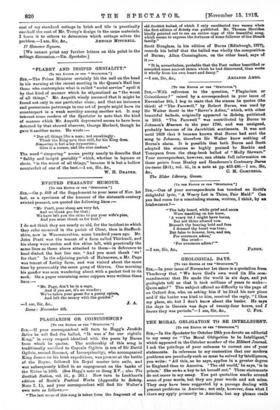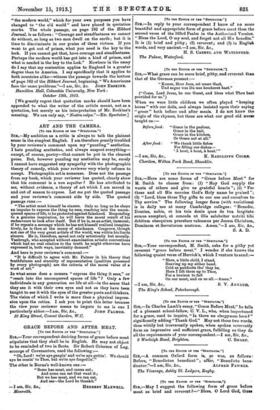THE MORAL OBLIGATION TO BE INTELLIGENT.
[To THE EDITOR or THE •• SPECTATOL'I Sin,—In the Spectator for October 18th you devote an editorial to my essay on "The Moral Obligation to be Intelligent," which appeared in the October number of the Hilbert Journal. I ask the privilege of your columns to correct one of your statements. In reference to my contention that our modern problems are peculiarly such as must be solved by intelligence, you write: "All this, so he says, applies in a greater degree to England than to America. ' The old world,' he says, `is in prison.' She seeks a key to let herself out." These statements do not occur in my essay. You put quotation marks around some of your words, but they are your words and not mine. They may have been suggested by a passage dealing with present problems in America ; not only, however, does what I there say apply primarily to America, but my phrase reads " the modern world," which for your own purposes you have changed to " the old world " and have placed in quotation marks. The whole passage, on page 182 of the Hibbert Journal, is as follows : " Courage and steadfastness we cannot do without, so long as two men dwell on the earth ; but it is time to discriminate in our praise of these virtues. If you want to get out of prison, what you need is the key to the lock. If you cannot get that, have courage and steadfastness. Perhaps the modern world has got into a kind of prison, and what is needed is the key to the lock." Nowhere in the essay do I say that my contention applies to England in a greater degree than to America. I say specifically that it applies to both countries alike—witness the passage towards the bottom of page 182 of the Hibbert Journal, beginning, " We Americans face the same problems."—I am, Sir, Sm. JOHN ERSKINE.
Hamilton Hall, Columbia University, New York : October 13th, 1913.
[We greatly regret that quotation marks should have been appended to what the writer of the article meant, not as a quotation, but merely as his interpretation of Mr. Erskine's meaning. We can only say, "Nostra culpa."—En. Spectator.]































































 Previous page
Previous page